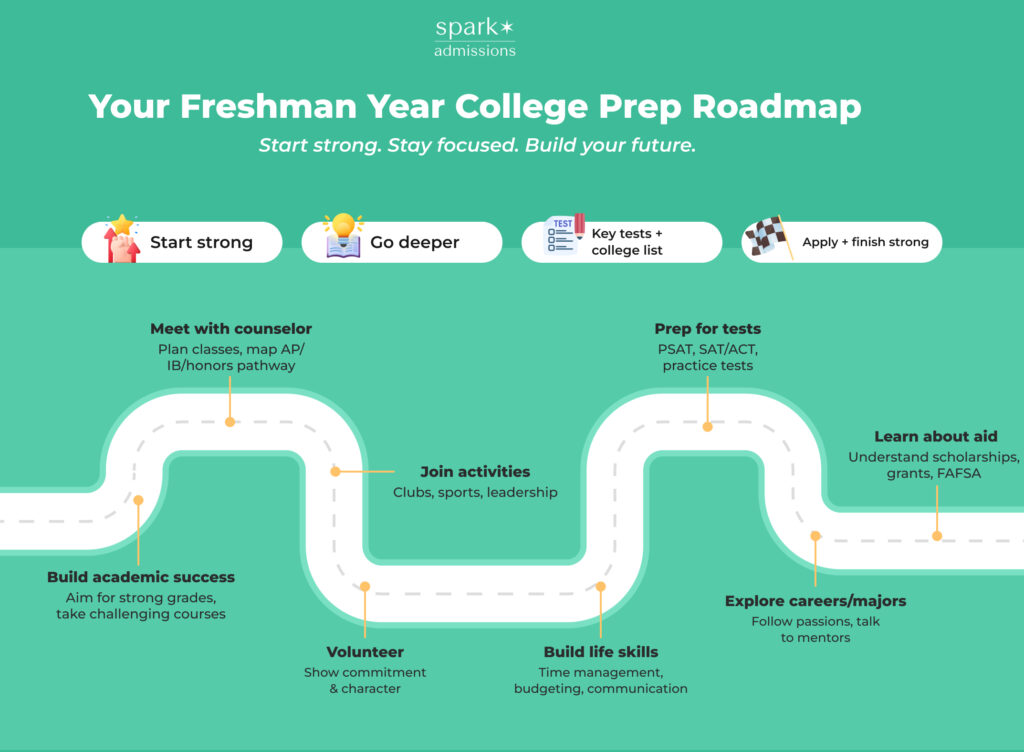
Starting high school is exciting, but if you’re a high school freshman with dreams of attending college, it’s never too early to begin preparing. Taking steps during your freshman year sets the stage for a smoother college admissions process down the road and increases your chances of getting into your top school.
Whether you’re aiming for an Ivy League university or another respected institution, here’s a comprehensive guide on how to prepare for college as a freshman.

Begin Preparing Early in High School
Many high school students don’t think about college until their junior or even senior year, but freshmen who begin preparing early have a major advantage. Freshman year is the perfect time to set academic and personal goals that align with your college preparation journey.
Start by meeting with your guidance counselor to map out your graduation requirements and ensure you’re on track to take challenging classes and Advanced Placement (AP), International Baccalaureate (IB), and/or honors courses later in high school. These more rigorous classes will help you earn college credit and stand out in the college admissions process.
Focus on Academic Success
One of the most important things colleges look at is your academic record. Building a strong GPA from your freshman year onward is essential. Make sure to enroll in challenging courses that demonstrate your willingness to tackle rigorous academics. If your school offers AP or IB classes, dual enrollment, or other advanced classes, talk to your school counselors about how and when to enroll in them.
Staying organized and practicing time management from the beginning will help you maintain good grades, balance extracurricular activities, and reduce stress during the school year.
Get Involved in Extracurricular Activities and Community Service
Extracurricular activities are key to showing college admissions officers that you’re a well-rounded student. Whether it’s joining a club, taking on leadership positions, or being part of an honor society, involvement outside the classroom makes a difference in your applications.
Volunteering particularly shows character, commitment, and compassion. Regular community service can also help you explore your potential career paths and connect with causes you care about. Start small with local projects, then look for ongoing opportunities that show long-term dedication. These experiences can be powerful additions to your college applications.
When selecting extracurriculars for psychology, aim for activities that combine academic learning with real-world application. Options like shadowing a school counselor, participating in peer mentoring, or conducting a small research project with a local university can demonstrate initiative and a deep interest in the subject. These experiences can strengthen your college application while also helping you develop practical skills for a future career in psychology.
Build Life Skills for College Success
While academic achievement is crucial, life skills are just as important for succeeding in college life. Start developing habits that support independence and personal growth, such as time management, organization, study strategies, budgeting and managing finances, and self-advocacy and communication skills.
These skills will help you thrive on a college campus, whether you’re navigating classes and group projects or adjusting to a new environment. Learning to cook a few basic meals, manage a schedule, or speak with teachers about your needs are all important steps toward adulthood.
Explore Potential Career Paths and College Majors
Although it’s early, freshman year is a great time to start thinking about your future career and what college majors might interest you. Use your high school years to explore subjects you’re passionate about and talk to teachers, mentors, or your school counselor about ways to dive deeper into those areas.
You can also attend college fairs and participate in a college campus tour or campus visits to get a feel for different schools and programs. Taking time to research colleges and understand what each school offers will make your college search more focused and informed.
Start Preparing for Standardized Tests
Even though standardized testing may seem far off, beginning your college preparation in this area can give you a major edge. Practice tests and AP courses can help you prepare for the types of assessments you’ll face during your junior and senior years.
In addition, if you plan to take the PSAT, you can use your freshman and sophomore years to study so you’re ready by junior year, which is when PSAT scores can qualify you for the National Merit Scholarship.
Learn About Financial Aid Early
Understanding how to pay for college is an essential part of your college journey. While you may not be applying for financial aid yet, it’s a good idea to start learning about options such as federal student aid, scholarships, and grants. Most colleges have a financial aid office with resources to help families plan.
Talk to your parents about saving for college, and make sure you know where to look for both merit-based and need-based aid. Having a general awareness of how financial aid works can reduce stress as the college admissions process progresses.
Connect with Your High School Community
Building relationships with your teachers, counselors, and older students can open doors. Your school counselors and teachers will eventually write your letters of recommendation, so getting to know them early helps. If your school offers academic advising or mentoring programs, take advantage of them.
Older students can share advice about college life, college classes, and what to expect on a college campus. These insights can help younger students like you prepare for the social and academic transition to college.
Set Goals for College Admissions
To prepare for college, start by setting short- and long-term goals. Think about where you want to go, what you might want to study, and how you can position yourself to get there. Make time to reflect on your progress at the end of each school year, and adjust your plans as needed.
Finding the Right Fit in Colleges and Campus Life
The college search process should be about more than just rankings. As early as freshman year, start exploring what kind of college environment will help you thrive both academically and personally.
Campus Life
Do you see yourself on a large, urban college campus, or would you feel more comfortable in a smaller, rural setting? Campus culture plays a huge role in your college experience, so consider visiting campuses or researching online to get a sense of the environment.
College Majors
Different colleges offer different strengths. If you’re already interested in a subject or potential college major, look for schools with strong programs and faculty in that area.
Academic Support and Advising
Most colleges offer some form of academic advising to help students navigate their programs. Explore what each school offers in terms of tutoring, mentoring, or personalized guidance.
Financial Aid
The cost of college is a major factor in decision-making. Be sure to research what types of financial aid each college offers, including scholarships, grants, and work-study programs. Schedule a time with the financial aid office during your campus tour or virtual visit to ask questions.
Experiential Opportunities
Does the college provide access to internships, cooperative education, or study abroad programs? These experiences can be invaluable as you prepare for a future career.
College Fairs and Campus Visits
Attend college fairs to speak with representatives and gather materials. If possible, visit colleges in person to experience the campus vibe, student life, and facilities. Seeing campuses for yourself will help you narrow your list of colleges as you approach the admissions process.

Year-by-Year College Preparation Guide
Freshman Year
Start laying the foundation for college success. Meet your high school guidance counselor to plan your academic path. Focus on good grades and build strong study habits.
Get involved in extracurricular activities and start logging hours of community service. Explore your interests to identify possible college majors. Begin learning about the college admissions process so you understand what lies ahead.
Sophomore Year
Build on your freshman experience with more academic and extracurricular depth. Take more challenging classes, including honors or AP courses, if available.
Deepen involvement in existing clubs or try something new. Consider college fairs and start campus visits if possible.
Prepare for the PSAT and explore other standardized tests. Research colleges to start understanding your options.
Junior Year
This is the most critical time to prepare for your college applications. Take the SAT or ACT, and build a college list with the help of your parents, school counselor, and other trusted advisors.
Pursue leadership roles in clubs, sports, or service organizations. Attend college fairs and go on formal campus tours. Visit financial aid offices during campus visits to learn more about available support.
Enroll in Advanced Placement, International Baccalaureate, or dual enrollment courses if offered. Start outlining your college application strategy and essay topics.
Senior Year
Put everything into motion as you complete the college admissions process. Finalize and submit your college applications on time. Write your college essay and gather letters of recommendation.
Continue earning college credit through advanced coursework. Apply for federal student aid and any relevant scholarships. Track all deadlines for applications, test scores, and financial aid submissions.
Celebrate your accomplishments and get excited to start college!
Get Started in the Right Direction with Expert Help
Preparing for college as a freshman isn’t about doing everything all at once—it’s about beginning to prepare with intention. With a clear plan, a strong support system, and a curiosity for learning, you’ll be ready to take on the college admissions process with confidence.
Do you need more personalized guidance on your college journey? Spark Admissions offers expert consulting to help students at every stage of high school. Whether you’re a high school freshman or an upperclassman, we’ll help you reach your academic goals and stand out to college admissions officers.


